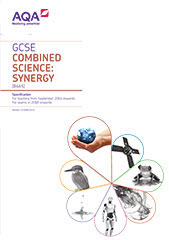Introduction
Why choose AQA for GCSE Combined Science: Synergy
Our philosophy: science for all
We believe that science has something to offer every student, and that everyone needs some level of relevant scientific understanding.
That's why we have a suite of science qualifications for Key Stage 4 – so that students of all abilities and all aspirations can realise their potential.
Two sections for two teachers
Teachers have told us that:
- many schools organise their curriculum drawing on the experience of two teachers
- science teachers tend to be more confident around either the life sciences or the physical sciences
- science learning is enriched when teaching draws on different areas that can be naturally linked together.
We have divided the content into two main sections, which contain connections between areas of biology, physics and chemistry that sit together as part of good science.
Life and environmental sciences (4.1–4.4)
- 4.1 Building blocks: from atoms to cells, behaviour and transport on the small scale.
- 4.2 Transport over larger distances: systems in animals and plants and how these systems interact.
- 4.3 Interactions with the environment: the effects of factors in the environment on organisms, how our choices affect our health.
- 4.4 Explaining change: how organisms, species, living and non-living systems change over time.
Physical sciences (4.5–4.8)
- 4.5 Building blocks for understanding: organising, patterns, properties and analysis.
- 4.6 Interactions over small and large distances: strong and weak forces between atoms, molecules and larger structures and how they interact.
- 4.7 Movement and interactions: rates of change of motion and direction of large and small objects, and chemical changes.
- 4.8 Guiding Spaceship Earth towards a sustainable future: resources of materials and energy.
Both sections include topics that draw together and apply key concepts. Examples in Life and environmental sciences include Radiation and risk and The Earth's atmosphere. In these topics, earlier work on atomic structure, waves and electromagnetic radiation is used to explain the effects of different types of radiation on human tissues and on the climate. An example in Physical sciences is Resources of materials and energy, which introduces life cycle assessment as a way of evaluating the impacts of using materials and energy to manufacture useful products.
Inspire students with rich practical activities
There’s no better way to learn about science than through purposeful practical activities as part of day-to-day teaching and learning. Our 21 required practicals:
- are clearly laid out in the specification, so you know exactly what’s required
- are deliberately open, so you can teach in the way that suits you and your students
- have already been trialled in schools.
You’ll find even more support and guidance in our practical handbook, which includes recommendations and advice from teachers in the trial.
Straightforward exams, so students can give straightforward answers
We’ve improved our question papers. You’ll find that our exams:
- use more straightforward language and fewer words so they’re easier to understand
- have fewer contexts so students don’t get confused
- have questions that increase in difficulty so students feel confident
- have been written with our GCSE Mathematics and A-level science teams, so students have consistency between content and questions.
Over 3,000 students have sat our specimen question papers and they agree that they’re clearer and more straightforward than ever.
We don’t profit from education – you do
We are an educational charity focused on the needs of teachers and students. This means that we spend our income on improving the quality of our specifications, exams, resources and support.
You can find out about all our Combined Science: Synergy qualifications at aqa.org.uk/science
Support and resources to help you teach
We’ve worked with experienced teachers to provide you with a range of resources that will help you confidently plan, teach and prepare for exams.
Teaching resources
Visit aqa.org.uk/8465 to see all our teaching resources. They include:
- additional practice papers to help students prepare for exams
- schemes of work, written by experienced teachers
- a practical handbook, including recommendations and advice from teachers who’ve trialled our practicals
- AQA approved textbooks reviewed by experienced senior examiners
- subject expertise courses for all teachers, from newly qualified teachers who are just getting started to experienced teachers looking for fresh inspiration.
Preparing for exams
Visit aqa.org.uk/8465 for everything you need to prepare for our exams, including:
- past papers, mark schemes and examiners’ reports
- specimen papers and mark schemes for new courses
- Exampro: a searchable bank of past AQA exam questions
- exemplar student answers with examiner commentaries.
Analyse your students' results with Enhanced Results Analysis (ERA)
Find out which questions were the most challenging, how the results compare to previous years and where your students need to improve. ERA, our free online results analysis tool, will help you see where to focus your teaching. Register at aqa.org.uk/era
For information about results, including maintaining standards over time, grade boundaries and our post-results services, visit aqa.org.uk/results
Keep your skills up-to-date with professional development
Wherever you are in your career, there’s always something new to learn. As well as subject-specific training, we offer a range of courses to help boost your skills.
- Improve your teaching skills in areas including differentiation, teaching literacy and meeting Ofsted requirements.
- Prepare for a new role with our leadership and management courses.
You can attend a course at venues around the country, in your school or online – whatever suits your needs and availability. Find out more at coursesandevents.aqa.org.uk
Help and support available
Visit our website for information, guidance, support and resources at aqa.org.uk/8465
If you'd like us to share news and information about this qualification, sign up for emails and updates at aqa.org.uk/keepinformedscience
Alternatively, you can call or email our subject team direct.
T: 01483 477 756
